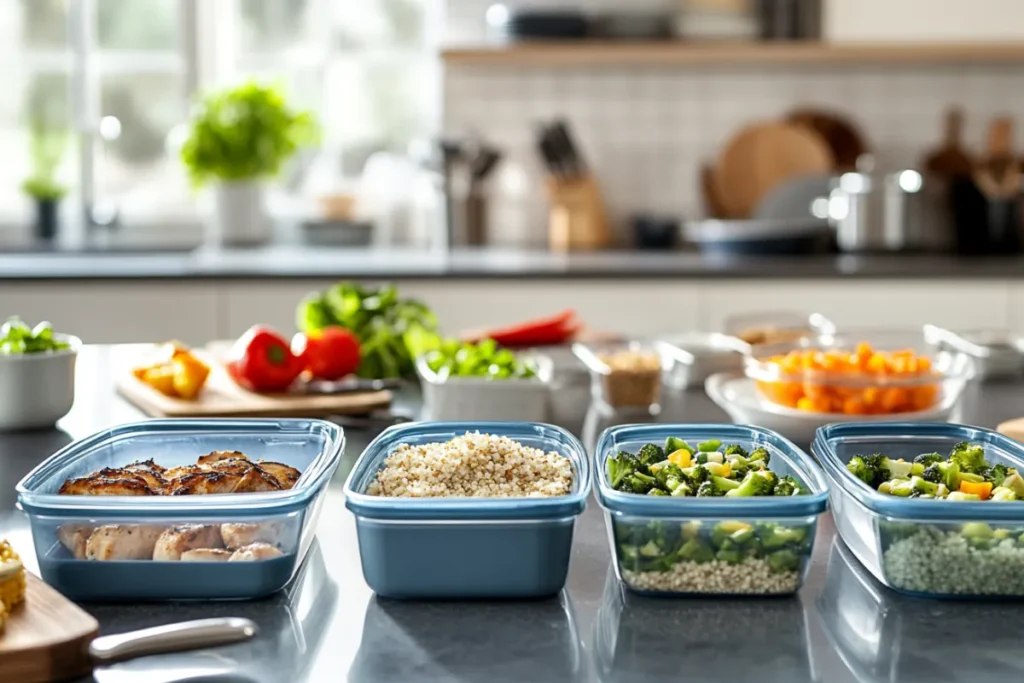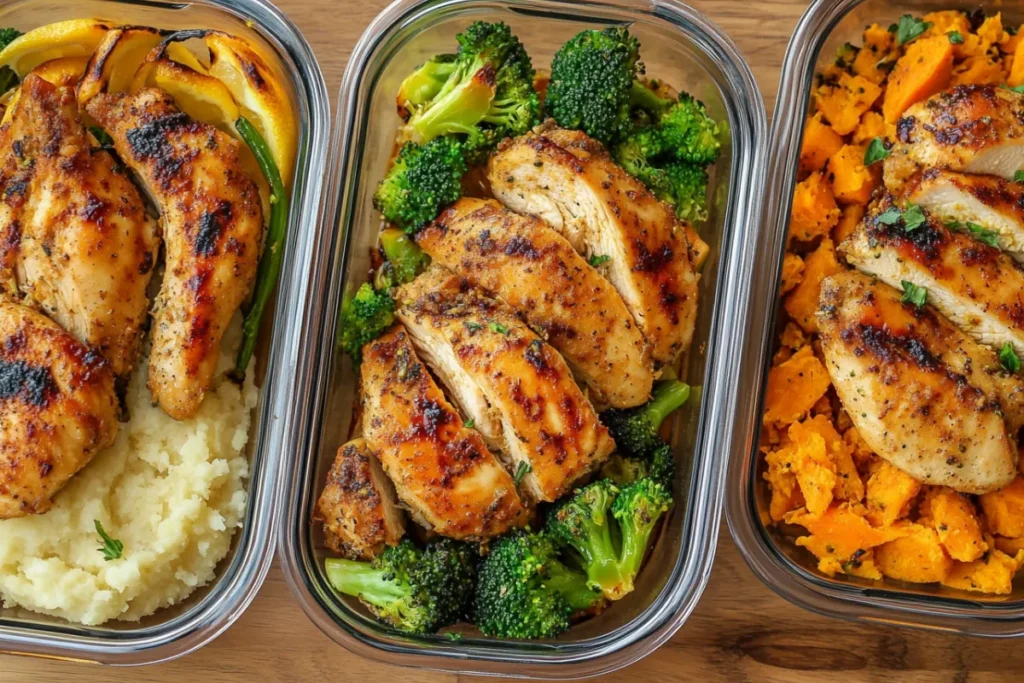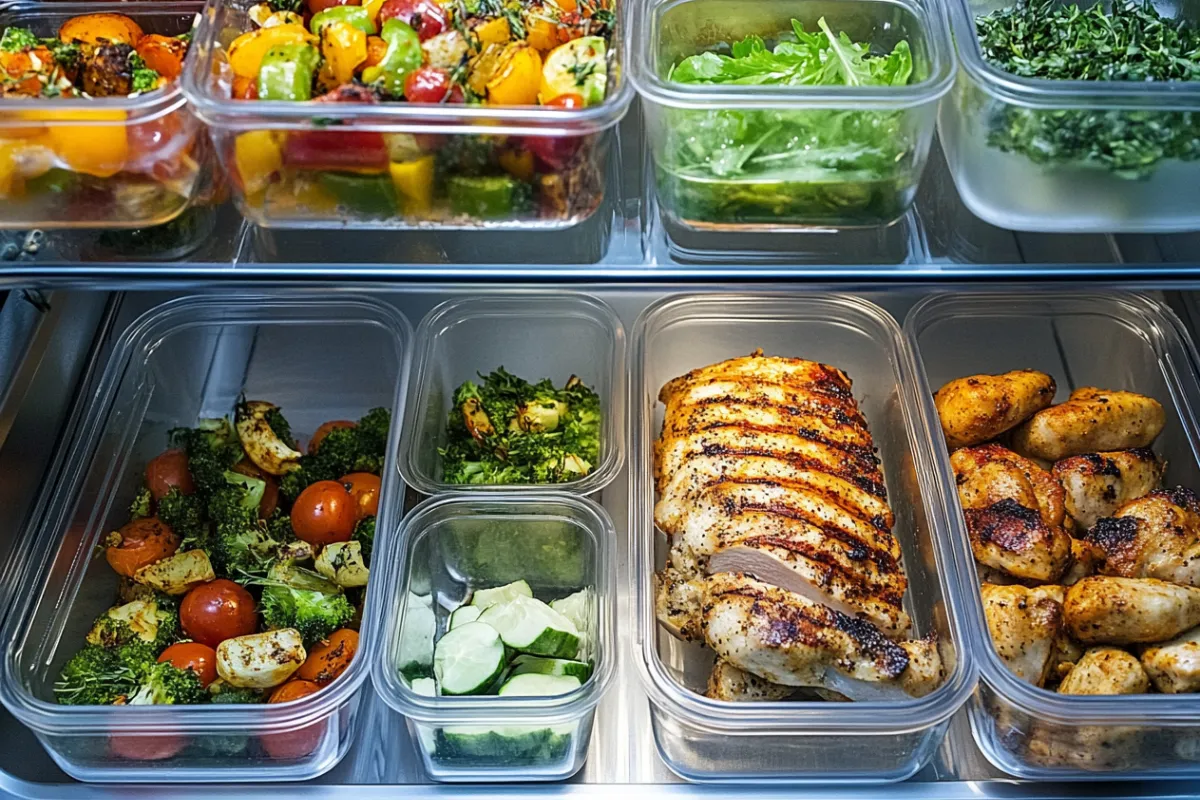Meal prepping has revolutionized the way people approach cooking. It’s a lifesaver for busy professionals, fitness enthusiasts, and even families. Among the many proteins, chicken reigns supreme due to its versatility and nutritional value. But, there’s a lingering question: Is it okay to meal prep chicken for a week? This article unpacks everything from safety tips and storage hacks to delicious recipes to ensure your meal prep game is on point.
Introduction to Meal Prepping Chicken
What Is Meal Prepping?
Meal prepping is the art of planning, preparing, and portioning meals ahead of time. It has gained immense popularity thanks to its convenience and efficiency. With meal prepping, you save time, reduce stress, and ensure that healthier choices are always at your fingertips.
Why Choose Chicken for Meal Prep?
Chicken is a powerhouse of nutrition, offering lean protein that supports muscle repair, immune health, and overall vitality. It’s also versatile—you can bake, grill, stir-fry, or roast it for different flavor profiles. Plus, it pairs well with almost any vegetable, grain, or seasoning.
Meal prepping chicken can help you plan balanced meals, avoid takeout, and stay on track with dietary goals. But what about safety? That’s where this article steps in to guide you through everything you need to know about meal prepping chicken for a week.
Keyphrase Introduction
To address your concerns, is it okay to meal prep chicken for a week, we’ll dive deep into proper storage, reheating methods, and delicious ways to keep meals fresh and enjoyable throughout the week. So, if you’ve ever hesitated to prep chicken ahead, worry no more—let’s explore!

Safety and Storage Guidelines
How Long Can You Store Cooked Chicken?
Knowing how long cooked chicken stays safe in the fridge is essential for successful meal prep. According to FDA guidelines, cooked chicken should be stored for no more than 3–4 days in the refrigerator at or below 40°F. Exceeding this time frame increases the risk of bacterial growth, which can lead to foodborne illnesses.
If you’re prepping for a week, consider freezing half of your meals to extend their shelf life. This ensures freshness and prevents spoilage.
Safe Practices for Meal Prepping Chicken
To ensure your chicken is safe to eat throughout the week, follow these guidelines:
- Cook chicken thoroughly: The internal temperature should reach at least 165°F.
- Prevent cross-contamination: Use separate cutting boards and utensils for raw chicken.
- Cool cooked chicken quickly: Avoid letting it sit out for more than two hours.
Sticking to these practices is key to maintaining the quality and safety of your meal-prepped chicken.
Proper Storage Techniques for Prepped Chicken
Storage plays a pivotal role in keeping your chicken fresh. Use airtight containers—preferably glass containers or BPA-free plastic ones—to prevent air exposure. Additionally:
- Organize your fridge so cooked chicken is stored on the middle or upper shelf.
- Avoid storing chicken alongside raw produce to prevent contamination.
Can You Freeze Meal Prepped Chicken?
Freezing is an excellent solution for extending the usability of your prepped chicken. Here’s how to freeze it effectively:
- Portion the chicken into meal-sized servings.
- Store portions in freezer-safe bags or containers, removing as much air as possible.
- Label each package with the date to ensure it’s consumed within 2–3 months.
When you’re ready to eat, defrost the chicken in the fridge overnight. Avoid thawing it at room temperature, as this could lead to bacterial growth.
Benefits of Meal Prepping Chicken for a Week

Time and Cost Efficiency
Meal prepping chicken can save you hours of cooking time during the week. By dedicating a few hours on one day to prepare meals, you eliminate the need to cook every day. This efficiency gives you more time to focus on work, family, or relaxation.
Moreover, buying chicken in bulk is more cost-effective than purchasing smaller portions daily or ordering takeout. By prepping ahead, you cut down on waste and save money on last-minute food purchases.
Health and Nutrition Advantages
When you meal prep chicken, you control the ingredients, ensuring your meals are nutritious and balanced. Chicken is a lean protein packed with essential nutrients like B vitamins and selenium, making it an excellent choice for maintaining energy levels and supporting overall health.
Pairing chicken with vegetables, whole grains, and healthy fats in your prepped meals helps you avoid the temptation of fast food and highly processed snacks. You can even customize meals to align with specific dietary goals, such as weight loss or muscle gain.
Environmental Impact
Meal prepping also benefits the environment. By portioning your meals ahead of time, you minimize food waste and ensure every part of the chicken gets used. Additionally, using reusable containers reduces your reliance on single-use plastics, making meal prepping a more sustainable practice.
Enjoying Consistency in Your Diet
By prepping meals ahead, you establish a consistent diet that can help you track calories, macronutrients, or specific food groups. This consistency is especially beneficial for those with busy lifestyles or fitness goals. It’s much easier to stay on track when your meals are already prepared and ready to go.
Tips for Successful Chicken Meal Prep
Choosing the Right Cuts of Chicken
The cut of chicken you choose can make or break your meal prep. Opt for chicken breasts if you prefer lean protein with minimal fat. Thighs, on the other hand, are juicier and more forgiving when reheated. Drumsticks and wings can also be used but are less versatile for balanced meals.
For week-long meal prep, boneless and skinless cuts are generally more convenient as they cook faster and store more easily.
Flavoring and Marinating Chicken
One way to avoid meal prep fatigue is by experimenting with flavors. Marinating chicken not only enhances its taste but also keeps it moist during reheating. Here are some popular marinades:
- Lemon Herb: A mix of lemon juice, garlic, olive oil, and fresh herbs.
- Teriyaki Sauce: A savory-sweet blend of soy sauce, honey, and ginger.
- Cajun Spice Rub: A zesty mix of paprika, cayenne, and garlic powder.
Pro tip: Marinate the chicken for at least 4–6 hours (or overnight) for deeper flavor. If freezing, you can freeze chicken directly in the marinade for a quicker prep process later.
Best Cooking Methods for Meal Prep
Certain cooking methods are better suited for meal prepping chicken:
- Grilling: Adds a smoky flavor and sears the chicken for a firm texture.
- Baking: An easy hands-off method that keeps the chicken tender.
- Slow Cooking: Ideal for shredding chicken to use in wraps, tacos, or salads.
Steaming or boiling chicken can work but may leave it slightly bland or dry when reheated.
Portioning for Individual Meals
Portioning ensures you have the right balance of protein, carbs, and vegetables in every meal. Use a food scale to measure portions, typically aiming for 3–6 ounces of chicken per serving. Pair your chicken with sides like:
- Roasted vegetables (broccoli, carrots, zucchini).
- Complex carbs (quinoa, brown rice, or sweet potatoes).
- Leafy greens for a low-carb option.
This approach keeps meals balanced and ensures you don’t run out of prepped chicken midweek.
Avoiding Monotony in Your Meals
Mixing up your sides, seasonings, and cooking techniques can keep your meals exciting. For example, pair grilled Cajun chicken with roasted sweet potatoes one day and use the same chicken in a salad wrap the next.
Addressing Common Concerns
Does Chicken Lose Its Freshness by the End of the Week?
One of the biggest concerns about meal prepping chicken is whether it stays fresh for the entire week. The answer largely depends on proper storage. When refrigerated, prepped chicken is best consumed within 3–4 days. However, freezing the chicken for meals later in the week ensures it remains fresh and flavorful.
To keep the texture and taste intact, use airtight containers and avoid exposing the chicken to air or moisture. If your chicken seems off—e.g., it has a sour smell or slimy texture—it’s time to toss it out.
Is Reheating Chicken Safe?
Absolutely! Reheating chicken is safe as long as it’s done correctly. To retain its moisture:
- Microwave: Reheat in short intervals with a splash of water or chicken broth.
- Oven: Warm the chicken in a foil-covered dish at 350°F for 10–15 minutes.
- Stovetop: Sauté on low heat with a bit of oil or water to prevent drying out.
Reheating once is ideal—avoid reheating the same batch of chicken multiple times to reduce the risk of bacterial growth.
How to Avoid Meal Prep Fatigue
Eating the same dish repeatedly can lead to boredom, but a few simple tweaks can keep your meals exciting:
- Rotate Flavors: Use different marinades and spices for variety.
- Switch Sides: Alternate between grains, roasted vegetables, and salads.
- Create New Dishes: Use prepped chicken in wraps, tacos, stir-fries, or soups to transform the meal.
Practical Chicken Meal Prep Examples
Weekly Meal Prep Recipes
Meal prepping chicken doesn’t have to be monotonous. Below are three creative and delicious recipes that can keep your taste buds excited throughout the week:
- Lemon Garlic Chicken with Broccoli and Quinoa
- Ingredients: Chicken breasts, garlic, lemon juice, olive oil, steamed broccoli, and quinoa.
- Method: Bake the marinated chicken at 375°F for 25 minutes. Serve with steamed broccoli and cooked quinoa for a balanced meal.
- Teriyaki Chicken Stir-Fry with Brown Rice
- Ingredients: Chicken thighs, teriyaki sauce, bell peppers, snap peas, and brown rice.
- Method: Sauté chicken with teriyaki sauce and vegetables over medium heat. Pair with cooked brown rice for a wholesome dish.
- Cajun-Spiced Chicken with Sweet Potato Mash
- Ingredients: Chicken thighs, Cajun seasoning, sweet potatoes, butter, and parsley.
- Method: Grill Cajun-seasoned chicken and serve with mashed sweet potatoes. Add fresh parsley for garnish.
Customizing Prepped Meals
One of the best aspects of meal prepping is its adaptability. You can customize meals to suit your preferences or dietary needs:
- Low-carb options: Replace grains with extra veggies like cauliflower rice or zucchini noodles.
- Vegan-friendly sides: Pair chicken with plant-based options like roasted chickpeas or lentil salads.
- Spice variations: Experiment with global flavors like Indian curry, Mexican chipotle, or Mediterranean herbs.
Mix-and-Match Strategy
Prepare a batch of plain grilled chicken and keep several marinades or sauces ready on the side. Throughout the week, you can transform the same chicken into different dishes by adding teriyaki sauce one day, a creamy garlic sauce the next, and so on.
FAQs Section
Is it okay to eat chicken meal prepped for a week?
Yes, it is safe to eat chicken meal prepped for a week if you follow proper storage guidelines. Refrigerated chicken should be consumed within 3–4 days, while frozen portions can last up to 2–3 months. Always reheat chicken to an internal temperature of 165°F before eating.
How can I tell if prepped chicken has gone bad?
Spoiled chicken often has a sour smell, slimy texture, or discoloration. If you notice any of these signs, discard the chicken immediately to avoid the risk of foodborne illnesses.
Can I reheat meal-prepped chicken more than once?
It’s best to reheat chicken only once to maintain its quality and reduce the risk of bacterial growth. Portion your meals appropriately to avoid reheating the same batch multiple times.
What is the best way to reheat prepped chicken?
The best methods for reheating prepped chicken are:
- Microwave: Add a splash of water or broth and heat in short intervals.
- Oven: Reheat at 350°F covered with foil for 10–15 minutes.
- Stovetop: Warm with a bit of oil or water on low heat to retain moisture.
Should I marinate chicken before meal prepping?
Yes, marinating chicken before meal prepping can enhance flavor and keep it moist during reheating. You can even freeze the chicken in the marinade for added convenience and flavor.
Can I freeze chicken after it’s been meal prepped?
Absolutely! Freezing cooked chicken is a great way to extend its shelf life. Store it in airtight, freezer-safe containers or bags and consume it within 2–3 months for the best quality.
Conclusion
Recap of Key Points
Meal prepping chicken for a week is not only safe when done correctly but also incredibly beneficial for saving time, money, and effort. By following proper storage techniques and adhering to food safety guidelines, you can enjoy fresh, nutritious meals throughout the week without worry. Freezing meals for later in the week further ensures that your food stays as delicious and wholesome as the day you prepped it.
We’ve also explored how customizing flavors, experimenting with different recipes, and mixing up sides can prevent meal prep fatigue. With the right strategies, meal prepping chicken can become a seamless part of your lifestyle.
Encouragement to Start Meal Prepping Chicken
So, is it okay to meal prep chicken for a week? The answer is a resounding yes! With a little planning and creativity, you can transform your meal prep routine into an enjoyable and health-boosting habit. Try it this week and discover how easy it is to stay on track with your goals while savoring delicious, home-cooked meals every day.

